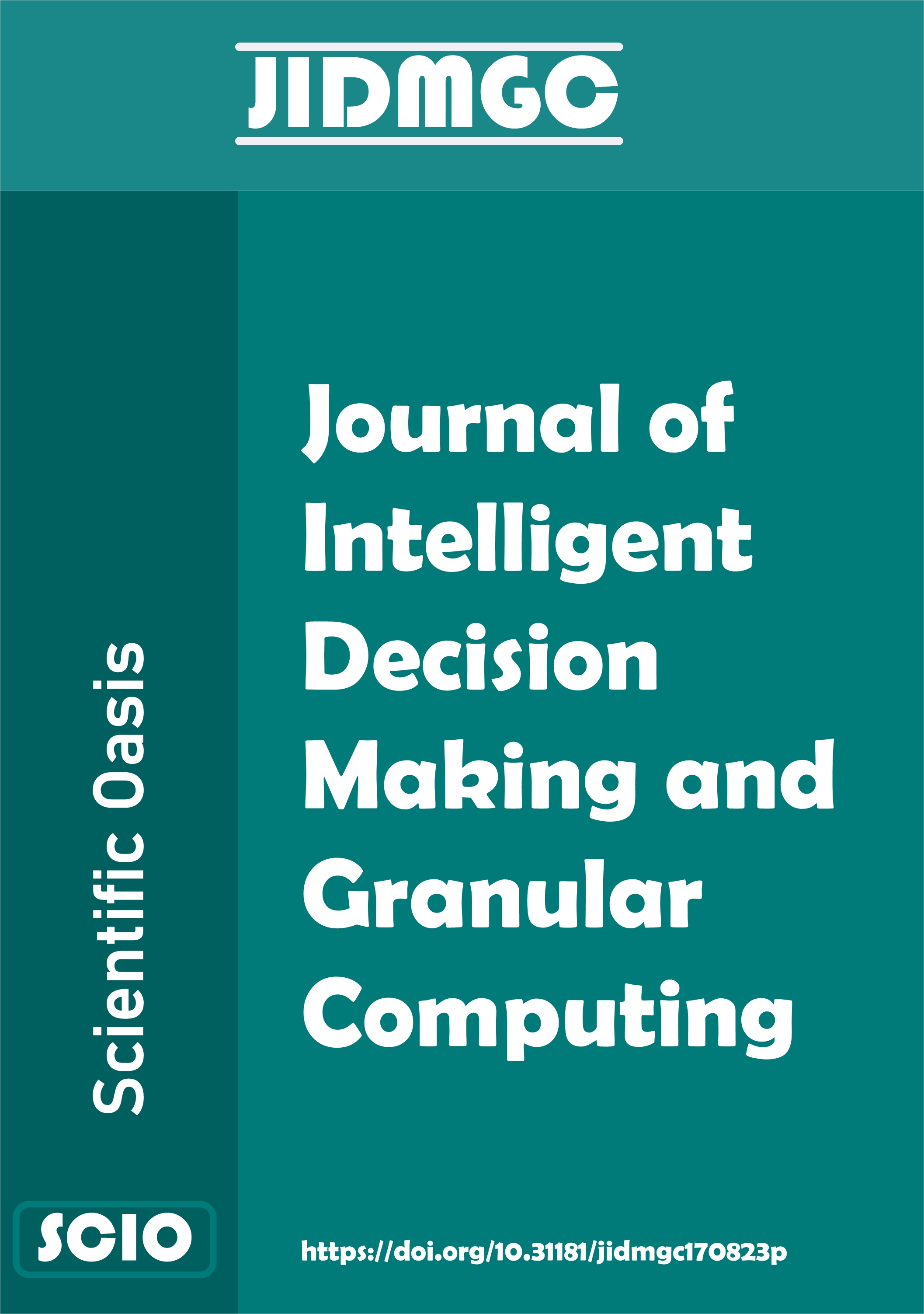Application of New Divergence Measure in Complex Fermatean Fuzzy Sets for Post-Flood Assessment
DOI:
https://doi.org/10.31181/jidmgc1120258Keywords:
Complex Fermatean fuzzy sets, Divergence measures, Decision making, Post-flood assessmentAbstract
Complex Fermatean fuzzy sets (CFFSs) combine complex fuzzy sets and Fermatean fuzzy sets, with membership, non-membership, and neutral degrees represented as complex numbers, thus enabling a more flexible and comprehensive representation of uncertainty. Nevertheless, a key unresolved challenge is how to measure the differences of CFFSs in decision-making processes appropriately. This paper introduces a new divergence measure based on CFFSs, aiming to overcome the limitations of existing measures. The proposed measure has been thoroughly validated to meet the required axioms, with its reliability and effectiveness confirmed through numerical comparisons. Additionally, we apply the proposed divergence measures to a post-flood assessment application, demonstrating their high confidence and consistency.
Downloads
References
Sadana, U., Chenreddy, A., Delage, E., Forel, A., Frejinger, E., & Vidal, T. (2025). A survey of contextual optimization methods for decision-making under uncertainty. European Journal of Operational Research, 320(2), 271–289. https://doi.org/10.1016/j.ejor.2024.03.020
Zhang, C., Xia, P., & Zhang, X. (2024). Multi-attribute decision-making method of pumped storage capacity planning considering wind power uncertainty. Journal of Cleaner Production, 449, 141655. https://doi.org/10.1016/j.jclepro.2024.141655
Hedayatipour, M., Etemadi, S., Hekmat, S. N., & Moosavi, A. (2024). Challenges of using evidence in managerial decision-making of the primary health care system. BMC Health Services Research, 24(1), 38. https://doi.org/10.1186/s12913-023-10409-7
Liu, Z., & Letchmunan, S. (2024). Enhanced fuzzy clustering for incomplete instance with evidence combination. ACM Transactions on Knowledge Discovery from Data, 18(3), 1–20. https://doi.org/10.1145/3638061
Asif, M., Ishtiaq, U., & Argyros, I. K. (2025). Hamacher aggregation operators for pythagorean fuzzy set and its application in multi-attribute decision-making problem. Spectrum of Operational Research, 2(1), 27–40. https://doi.org/10.31181/sor2120258
Liu, Z., Zhu, S., Senapati, T., Deveci, M., Pamucar, D., & Yager, R. R. (2025). New distance measures of complex fermatean fuzzy sets with applications in decision making and clustering problems. Information Sciences, 686, 121310. https://doi.org/10.1016/j.ins.2024.121310
Yousafzai, F., Zia, M. D., Khalaf, M. M., Ismail, R., et al. (2024). Linear diophantine fuzzy sets over complex fuzzy information with applications in information theory. Ain Shams Engineering Journal, 15(1), 102327. https://doi.org/10.1016/j.asej.2023.102327
Wang, C., Song, Z., & Fan, H. (2024). Novel evidence theory-based reliability analysis of functionally graded plate considering thermal stress behavior. Aerospace Science and Technology, 146, 108936. https://doi.org/10.1016/j.ast.2024.108936
Zadeh, L. A. (1965). Fuzzy sets. Information and Control, 8(3), 338–353. https://doi.org/10.1016/S0019-9958(65)90241-X
Atanassov, K. T. (1986). Intuitionistic fuzzy sets. Fuzzy Sets and Systems, 20, 87–96. https://doi.org/10.1016/s0165-0114(86)80034-3
Huang, W., Zhang, F., Wang, S., & Kong, F. (2024). A novel knowledge-based similarity measure on intuitionistic fuzzy sets and its applications in pattern recognition. Expert Systems with Applications, 249, 123835. https://doi.org/10.1016/j.eswa.2024.123835
Alreshidi, N. A., Shah, Z., & Khan, M. J. (2024). Similarity and entropy measures for circular intuitionistic fuzzy sets. Engineering Applications of Artificial Intelligence, 131, 107786. https://doi.org/10.1016/j.engappai.2023.107786
Yager, R. R. (2014). Pythagorean membership grades in multicriteria decision making. IEEE Transactions on Fuzzy Systems, 22(4), 958–965. https://doi.org/10.1109/TFUZZ.2013.2278989
Li, R., Ejegwa, P. A., Li, K., Agaji, I., Feng, Y., & Onyeke, I. C. (2024). A new similarity function for pythagorean fuzzy sets with application in football analysis. AIMS Mathematics, 9(2), 4990–5014. https://doi.org/10.3934/math.2024242
Liu, Z. (2024a). Hellinger distance measures on pythagorean fuzzy environment via their applications. International Journal of Knowledge-Based and Intelligent Engineering Systems, 28(2), 211–229. https://doi.org/10.3233/kes-230150
Akram, M., Luqman, A., Alcantud, J. C. R., et al. (2022). An integrated electre-i approach for risk evaluation with hesitant pythagorean fuzzy information. Expert Systems with Applications, 200, 117002. https://doi.org/10.1016/j.eswa.2022.116945
Senapati, T., & Yager, R. R. (2020). Fermatean fuzzy sets. Journal of Ambient Intelligence and Humanized Computing, 11, 663–674. https://doi.org/10.1007/s12652-019-01377-0
Büyüközkan, G., Uztürk, D., & Ilıçak, Ö. (2024). Fermatean fuzzy sets and its extensions: A systematic literature review. Artificial Intelligence Review, 57(6), 138. https://doi.org/10.1007/s10462-024-10761-y
Yu, J., Ding, H., Yu, Y., Wu, S., Zeng, Q., & Xu, Y. (2024). Risk assessment of liquefied natural gas storage tank leakage using failure mode and effects analysis with fermatean fuzzy sets and cocoso method. Applied Soft Computing, 154, 111334. https://doi.org/10.1016/j.asoc.2024.111334
Ramot, D., Milo, R., Friedman, M., & Kandel, A. (2002). Complex fuzzy sets. IEEE Transactions on Fuzzy Systems, 10(2), 171–186. https://doi.org/10.1109/91.995119
Alkouri, M. J. S., & Salleh, A. R. (2012). Complex intuitionistic fuzzy sets. AIP Conference Proceedings, 1482(1), 464–470. https://doi.org/10.1063/1.4757515
Wang, P., Zhu, B., Yu, Y., Ali, Z., & Almohsen, B. (2023). Complex intuitionistic fuzzy dombi prioritized aggregation operators and their application for resilient green supplier selection. Facta Universitatis, Series: Mechanical Engineering, 21(3), 339–357. https://doi.org/10.22190/fume230805029w
Liu, P., & Ali, Z. (2024). Hamacher interaction aggregation operators for complex intuitionistic fuzzy sets and their applications in green supply chain management. Complex & Intelligent Systems, 10(3), 3853–3871. https://doi.org/10.1007/s40747-023-01329-4
Mahmood, T., Ullah, K., Ali, Z., & Siddique, I. (2020). Complex pythagorean fuzzy sets and their applications in decision-making. Complex & Intelligent Systems, 6, 111–122. https://doi.org/10.1007/s40747-019-0103-6
Labassi, F., Rehman, U. U., Alsuraiheed, T., Mahmood, T., & Khan, M. A. (2024). A novel approach toward complex pythagorean fuzzy sets and their applications in visualization technology. IEEE Access, 12, 65838–65855. https://doi.org/10.1109/access.2024.3393138
Khan, M. S. (2025). Intelligent image segmentation via complex pythagorean fuzzy sets and level-set optimization. International Journal of Knowledge and Innovation Studies, 3(1), 50–59. https://doi.org/10.56578/ijkis030105
Rahman, K., Garg, H., Ali, R., Alfalqi, S. H., & Lamoudan, T. (2023). Algorithms for decision-making process using complex pythagorean fuzzy set and its application to hospital siting for COVID-19 patients. Engineering Applications of Artificial Intelligence, 126, 107153. https://doi.org/10.1016/j.engappai.2023.107153
Akram, M., Amjad, U., Alcantud, J. C. R., & Santos-García, G. (2023). Complex fermatean fuzzy n-soft sets: A new hybrid model with applications. Journal of Ambient Intelligence and Humanized Computing, 14(7), 8765–8798. https://doi.org/10.1007/s12652-021-03629-4
Ali, R., Rahman, K., & Muhammad, J. (2024). Complex fermatean fuzzy models and their algebraic aggregation operators in decision-making: A case study on COVID-19 vaccine selection. Journal of Operations and Strategic Analysis, 2, 119–135. https://doi.org/10.56578/josa020205
Zaman, M., Ghani, F., Khan, A., Abdullah, S., & Khan, F. (2023). Complex fermatean fuzzy extended TOPSIS method and its applications in decision making. Heliyon, 9(9), e19170. https://doi.org/10.1016/j.heliyon.2023.e19170
Garg, H., Dutta, D., Dutta, P., & Gohain, B. (2024). An extended group decision-making algorithm with intuitionistic fuzzy set information distance measures and their applications. Computers & Industrial Engineering, 197, 110537. https://doi.org/10.1016/j.cie.2024.110537
Liu, Z. (2024b). A distance measure of fermatean fuzzy sets based on triangular divergence and its application in medical diagnosis. Journal of Operations Intelligence, 2(1), 167–178. https://doi.org/10.31181/jopi21202415
Wu, X., Liu, Q., Liu, L., Yang, M.-S., & Zhang, X. (2025). New Jensen–Shannon divergence measures for intuitionistic fuzzy sets with the construction of a parametric intuitionistic fuzzy TOPSIS. Complex & Intelligent Systems, 11(2), 1–15. https://doi.org/10.1007/s40747-024-01761-0
Gohain, B., Chutia, R., & Dutta, P. (2022). Distance measure on intuitionistic fuzzy sets and its application in decision-making, pattern recognition, and clustering problems. International Journal of Intelligent Systems, 37(3), 2458–2501. https://doi.org/10.1002/int.22780
Ganie, A. H., Gheith, N. E. M., Al-Qudah, Y., Ganie, A. H., Sharma, S. K., Aqlan, A. M., & Khalaf, M. M. (2024). An innovative fermatean fuzzy distance metric with its application in classification and bidirectional approximate reasoning. IEEE Access, 12, 4780–4791. https://doi.org/10.1109/ACCESS.2023.3348780
Rani, D., & Garg, H. (2017). Distance measures between the complex intuitionistic fuzzy sets and their applications to the decision-making process. International Journal for Uncertainty Quantification, 7(5), 423–439. https://doi.org/10.1615/Int.J.UncertaintyQuantification.2017020356
Ullah, K., Mahmood, T., Ali, Z., & Jan, N. (2020). On some distance measures of complex pythagorean fuzzy sets and their applications in pattern recognition. Complex & Intelligent Systems, 6(1), 15–27. https://doi.org/10.1007/s40747-019-0103-6
Hatzimichailidis, A. G., Papakostas, G. A., & Kaburlasos, V. G. (2012). A novel distance measure of intuitionistic fuzzy sets and its application to pattern recognition problems. International Journal of Intelligent Systems, 27(4), 396–409. https://doi.org/10.1002/int.21529
Downloads
Published
Issue
Section
License
Copyright (c) 2025 Yuhan Li, Sijia Zhu, Juan Liao, Sukumar Letchmunan, Jiahao Shi, Zhe Liu (Author)

This work is licensed under a Creative Commons Attribution 4.0 International License.













 All site content, except where otherwise noted, is licensed under the
All site content, except where otherwise noted, is licensed under the 